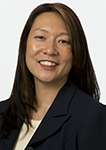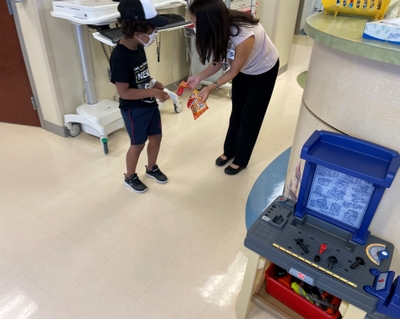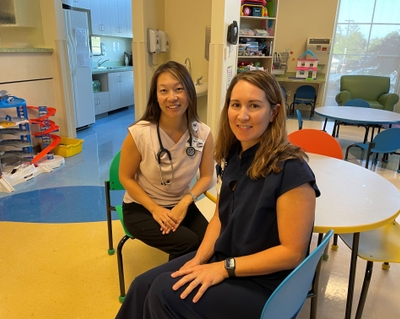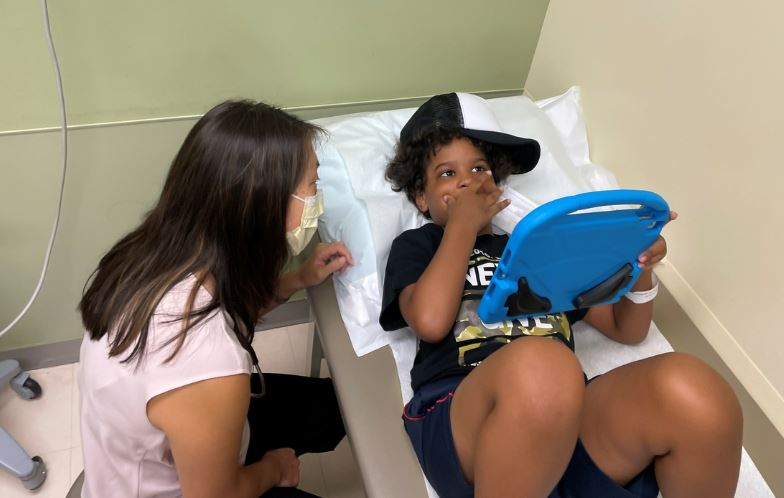By Ken Garfield, Novant Health Healthy Headlines
To find and book a pediatrician click here.
Dr. Jessica Bell was a child when she discovered what it means to pour your heart into medicine.
Today, she is a pediatric oncologist and lead physician at the St. Jude Affiliate Clinic at Novant Health Hemby Children’s Hospital in Charlotte. She and her team of six physicians care for cancer patients ranging in age from birth to their 20s.

Dr. Jessica Bell
The Affiliate Clinic, located across from Novant Healthy Presbyterian Medical Center in Charlotte, is one of eight nationwide affiliated with St. Jude Children’s Research Hospital in Memphis, and the only one in the Carolinas. More on that connection later.
But this story – Bell’s story – begins in Roanoke Rapids in eastern North Carolina. That’s where she saw the rewards that come with working to heal the sick, thanks to her father, who mastered the art of answering a page while playing the piano in church.
As complex as it is to be a pediatric oncologist, to Bell it’s simple: “If you can make a scared kid less scared? There’s your day right there.”
‘What could be better?’
Jessica’s father, Dr. Hung-Jen Fu was a thoracic surgeon. But in a small town like Roanoke Rapids, he’d treat what needed to be treated. Jessica remembers people coming up to him in a restaurant and pulling up their shirt to show off their surgical scar they still carried as a reminder to his care. She was in elementary school when she started escorting patients to the exam room or calling about a late payment. She smiles, imagining what the person on the other end of the line thought. “Who is this kid calling me about an overdue bill?”

Dr. Jessica Bell and patient Noah getting a snack before infusion.
Her father’s servant’s heart, as she calls it, sparked her own passion to heal others. After graduating from Williams College in Williamstown, Massachusetts, she volunteered in orphanages in Costa Rica. The frightened and the lost, these were the ones to whom she was drawn, and who were drawn to her.
Medicine became her way to help.
“Medicine wasn’t intimidating to me,” she says. “You put in the work. You help people. What could be better?” The day that Bell committed to pediatric oncology is the day she lost two patients to cancer during her residency at University of North Carolina Hospitals in Chapel Hill. “It basically came down to ‘This mattered,’” she said.
Two of her three siblings became physicians. One, Arthur, was an ophthalmologist. Cancer took him in 2020 at age 49. His loss reminds her of what she already knew, given the field she chose.
“We’re not immortal.”
Always looking for the bright side
A graduate of Wake Forest University School of Medicine in Winston-Salem, Bell, now 45, arrived at Novant Health in 2008. The relationship with St. Jude is at the heart of the Affiliate Clinic‘s work.
Founded in 1962, St. Jude treats childhood cancer and other life-threatening diseases. It sees more than 8,000 patients a year and is a worldwide leader in research on cancer and other catastrophic diseases affecting children. According to St. Jude, more than 400,000 children worldwide are afflicted with cancer each year. It is the leading cause of death by disease past infancy for U.S. children.
Novant Health’s affiliation with St. Jude means that we have access locally to some of the latest clinical trials, and patients can receive care there as their case warrants. Bell said the connection allows physicians here to share knowledge and talk about treatment plans with physicians at St. Jude and the other affiliate clinics.
In all, the Charlotte Affiliate Clinic sees more than 4,000 patients a year. Some 1,200 of those are in active treatment or monitoring following a diagnosis of cancer.
Not all of the cases handled at the clinic are life-threatening. Anemia, blood clots and immune disorders are among the diseases treated there. Typically, treatment for pediatric cancer patients involves some combination of chemotherapy, radiation and surgery. Bell said treatment for pediatric cancer can range from three months to three years. The most common cancer diagnosis among children is acute lymphoblastic leukemia. ALL is a cancer of the white blood cells, which are designed to protect the body against disease.
Julianna Viveiros of Mooresville was 12 when she was diagnosed with ALL in 2010. Twelve years later, she recalls how Bell spoke in a way that a child with questions could understand. During chemo, for example, Bell told Julianna that her treatment was like a lucky pair of socks that she needed to keep on her feet. “She was always looking for the bright side,” Viveiros said. “I never felt scared.”
Today, Viveiros, 25, is a research scientist in Raleigh. When she got married last September, she invited Bell.
“She and all the people I met when I was in treatment, they have a special place in my heart,” Viveiros says. “When you’re around that type of kindness you can’t help but want to be like that.”
‘Kids love her’
Most patients are referred to the Affiliate Clinic by a pediatrician or ER physician, their symptoms warranting further examination. When those symptoms portend cancer, Bell breaks the news.
Outside the door to the examining room, she’ll pray first. “Dear Lord, put the words in my mouth. Let me do your will.” And then she steps into the room and closes the door behind her.

Dr. Bell and nurse Karen Hinkle.
Bell speaks Spanish, a blessing for those families able to receive the diagnosis in their native tongue. She’ll focus first on the patient rather than parents or caregivers. If it’s a child, she’ll get down on the floor eye to eye, take a hand and explain that we need to get rid of these “stupid cells.” Some children, she says, associate cancer with Grandma dying. This isn’t that, she tells them. There is treatment, and often a cure. If it’s a teenager, she might use a car analogy to explain the need to keep cancer cells from spreading. “The brakes are gone and we have to put on the brakes.”
Nurse Karen Hinkle, who works with Bell, never ceases to be amazed by her gift for communicating compassion.
“Kids love her,” Hinkle said. “She commands the room. She brings a sense of calm and peace.” Before a family leaves the room, Bell will explain the course of care that begins immediately. Said Hinkle: “She wants not to fail. That’s part of her being. She’ll tell them ‘See you Monday.’”
‘I am still the child’s physician’
Bell sees more than 40 new cancer patients each year. Some 80% to 85% of these patients will likely be cured. That means she can lose five or more patients a year.
Once on a summer’s night, she spent two hours at the bedside of one of those patients. The child had been fighting cancer for years. Cancer was about to prevail. “In that moment,” Bell explained, “I am still the child’s physician. It’s my job to help the parents prepare for their child to leave this world, and to honor the child.” She helped lead prayer. She removed all the medical lines so his parents could see their child untethered, as he was meant to be.
When the time came, Bell was where she was called to be, at the intersection of life and death, curing when she could, comforting when she couldn’t.
“I wanted his body to be at peace,” Bell said.
‘You’re never alone’
The challenges that pediatric oncologists face are daunting.
Bell choked back tears several times during the interview for this story. But she works to keep her emotions in check when she is with a patient and family. The calmer she is, the calmer they are.
She is a physician. But she is also a person of faith. “You’re never alone,” she said. “The only way we’re put back together is through a divine process. I don’t know that humanity can do it on their own.”
Her schedule is busy and unpredictable. But she recharges by reading escapist fiction and enjoying sushi dinners out with friends. If she’s home on the computer working on patients’ charts, she often puts on headphones and listens to Sting, Adele or Nina Simone.
She is a wife and mother of two who works to separate work and family. Family, she says, comes first.
But the calling she answered means that she is never far from her patients, or from that little girl who discovered long ago what it means to have a servant’s heart. The Bells might be on vacation when their son or daughter ask, “Why is mom crying at the beach?”
The answer: Because she is answering the call she first heard long ago.
Novant Health
Healthy Headlines
Facebook
Instagram
Twitter
YouTube




